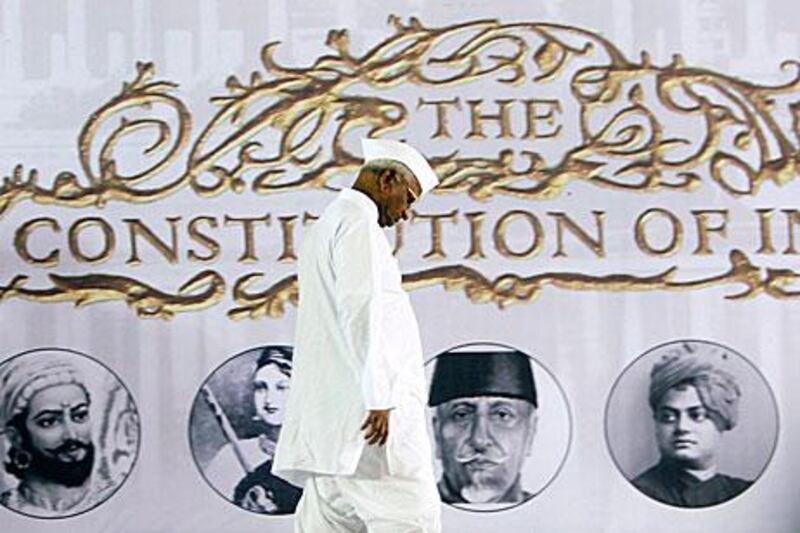NEW DELHI // The anti-corruption movement that seemed to energise India's middle class just a few months ago, led by a once-obscure social activist who defied the government with public fasts and mass rallies, is facing a new enemy: apathy.
Anna Hazare's supporters, some of whom had pledged their lives to his cause, barely bothered to show up at his last fast, which was called off after less than 36 hours. Government officials speak of him derisively. Mr Hazare's ultimate goal, legislation to create a powerful anti-corruption watchdog organisation, has stalled in parliament. Mr Hazare is in hospital, with doctors insisting on rest.
The man who dominated Indian television news for much of the year now seems like an afterthought, raising questions about whether his following was ever as large as it was portrayed.
"The movement has run out of steam," said Siddarth Mishra, a columnist for The Pioneer newspaper who has written extensively about the anti-corruption campaign.
At its August peak, tens of thousands of middle-class protesters turned out in New Delhi to support the former army driver, often wearing paper hats proclaiming "I am Anna".
But in a country of 1.2 billion people, where protests that large are fairly commonplace, many now wonder if the Hazare phenomenon was more about television than reality.
"The media made it look very big," Mr Mishra said. "It provided for a lot of discussion on television but nothing beyond that."
In the end, the movement had only one weapon: an elderly man who portrayed himself as a near-saint, compared himself to India's greatest hero, Mahatma Gandhi, and threatened to die for his beliefs. For a time, those threats terrified the government, suddenly giving Mr Hazare immense political power.
"His willingness to say he would die for this cause is what was so startling," said Mukul Kesavan, a professor at Jamia Milla Islamia university in New Delhi. "But how often can a 74-year-old man starve himself to death?"
He believes, though, that the movement won't disappear.
"I think they live to fight another day," said Prof Kesavan. "It will be interesting to see how they fight." he said, and whether Hazare's fasts remain the centre of the campaign.
Mr Hazare, from western India, emerged as a national figure last year, tapping into public anger over a series of immense corruption scandals, including US$4 billion (Dh14.68bn) that disappeared during the 2010 Commonwealth Games, and a cell phone licensing scandal that cost the government up to $36 billion in lost revenue.
Many observers were surprised at how quickly the movement faded.
In early December, Mr Hazare was promising an enormous rally later that month in Mumbai, with a three-day hunger strike and promises to fill Indian jails with supporters who would offer themselves up for arrest.
Instead, the rally was a flop. At times, only a few hundred supporters were at the park where Hazare was fasting, a park that can hold up to 60,000 people. Protests elsewhere by his backers saw gatherings as small as a dozen people.
The fast was soon cancelled. The plan to fill India's jails was abandoned. The watchdog legislation - which Hazare has criticised as a watered-down version of what he really wants - passed Parliament's lower house, but got stuck in the upper house. The bill is in limbo until Parliament reconvenes in March.
And there's another reason things may have not gone well for Mr Hazare in Mumbai.
A businessman out for a walk yesterday morning said he went to one of Hazare's New Delhi protests, but didn't expect much turnout for the Mumbai rally, which was held a couple days before New Year's Eve.
"There are a lot of parties that time of year. People are busy." said R Sharma. "It's not really a good time to protest."





